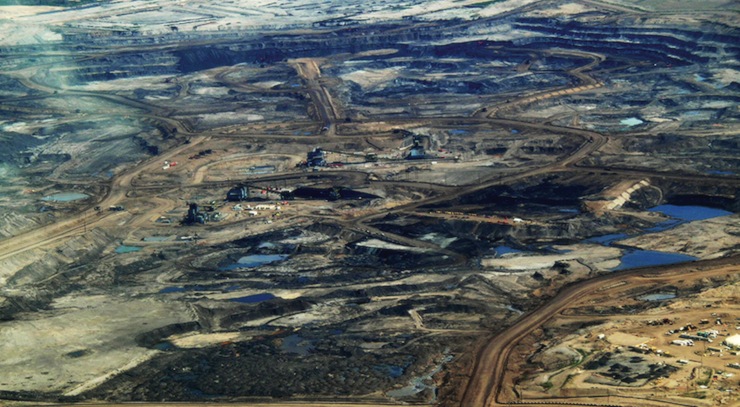Canada is a world-class climate dinosaur. We aren’t the leading per capita GHG emitter (that is Qatar), but we may get there yet. We signed and ratified Kyoto, but ignored it for years, radically exceeded our promised emissions target and then just abandoned the agreement. We are the only nation to just walk away (though the Americans signed, but never ratified).
Canada is a world-class climate dinosaur. We aren’t the leading per capita GHG emitter (that is Qatar), but we may get there yet. We signed and ratified Kyoto, but ignored it for years, radically exceeded our promised emissions target and then just abandoned the agreement. We are the only nation to just walk away (though the Americans signed, but never ratified).
Since Stephen Harper became Prime Minister, we have quietly worked at limiting new climate agreements. While they are at it, our government is also undoing environmental protections of all kinds, especially those that inconvenience resource industries and the unhindered expansion of tar sands extraction.
Fifty thousand Americans recently demonstrated in Washington against a Canadian pipeline. Notable celebrities were arrested. A New York Times editorial called on President Obama to reject the Keystone XL pipeline. One of these days Obama may want Canada to actually look like it cares about climate change, especially if he ever wants to approve said pipeline.
Here is a serious question: Is there anything Canada can do at this point to redeem its global reputation? Anything short of closing down tar sands operations? The present government might not be willing to do enough – it might not be willing do anything – to redeem the way the world sees us, but let’s just imagine that someday soon there will be a government that cares. Or one that gets a phone call from Washington asking them to at least look like they do.
Nevertheless I am pretty sure no Canadian government is likely to abruptly halt existing or already approved tar sands operations. So, let us ask, what might a government do to put some lipstick on Canada-the-climate-change-dinosaur? Is it still possible to look like we are trying to make amends? I mean look like it to someone outside Harper’s coterie of acolytes.
Here are some possibilities – we might need to do all of them, or the equivalent, if we don’t want to walk around without a bag over our collective head:
- If our government plans to complete the tar sands development that is underway it will need to state that there will be no more approvals unless and until the climate impacts of new extraction and processing is less than that of conventional oil. This might be accomplished, for example, using now experimental processes that convert most carbon dioxide emissions into chalk (rather than, for example, pumping it into leaky underground hideaways. That oil might then actually be ethical oil, or at least getting closer to it – not just hyped-up-ethical-oil.)
- Also – and this is a tough one – pledge to gradually phase out or adapt existing high emission tar sands operations once the standard set out above is achieved.
- Act as well with regard to the rest of our energy system. Take strong action on energy efficiency and renewable energy including feed-in-tariffs and/or renewable energy mandates for electrical utilities in most provinces and phase out coal-fired power plants in all provinces. If the Saudis can go big into solar and wind, as they are planning now to do, so can Canada.
- Now we are getting close, but we will still need to show the world that we remember our internationalist roots. Start by taxing carbon (British Columbia has done it and so, now, has China!) and use the revenue to pay for reductions in GHG emissions around the world. We could support actions that simultaneously advance atmospheric carbon reduction and social equity. The possibilities are legion: efficient and clean urban transit initiatives, forest restoration and subsidizing technologies that reduce black carbon (soot) emissions in poorer nations.
Reducing black carbon emissions gets carbon out of the atmosphere quickly at a relatively low cost by replacing kerosene lamps with solar lamps and providing high efficiency cook stoves to replace open wood and dung fires. Details on black carbon options are provided in an extensive recent analysis published by the American Geophysical Union.
Canada once had a very positive international reputation. Such a reputation will not be restored through spending billions on overpriced warplanes. It might be restored by remembering how to be the globally responsible nation we once were.
Robert Paehlke is a professor emeritus at Trent University where he taught environmental policy and politics for 35 years. About 40 years ago, he envisioned a magazine that was both scientifically sound and journalistically interesting, and Alternatives was born. “Bob P,” as we call him, sits on the magazine’s editorial board and he contributes articles and blog posts as often as we can trick him into it.
He is the author of Environmentalism and the Future of Progressive Politics (1989), Democracy’s Dilemma: Environment, Social Equity and the Global Economy (2004), Some Like It Cold: The Politics of Climate Change in Canada (2008) and Hegemony and Global Citizenship (2014).












